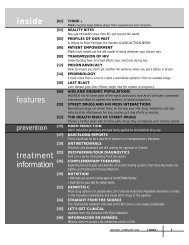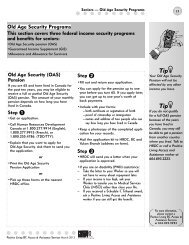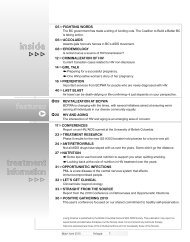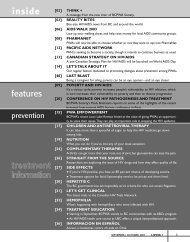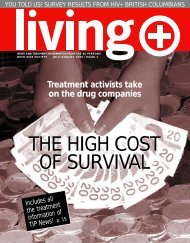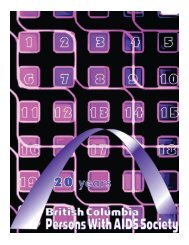iv poz mag.qxd - Positive Living BC
iv poz mag.qxd - Positive Living BC
iv poz mag.qxd - Positive Living BC
Create successful ePaper yourself
Turn your PDF publications into a flip-book with our unique Google optimized e-Paper software.
issue 50.<strong>qxd</strong>:l<strong>iv</strong> <strong>poz</strong> <strong>mag</strong>.<strong>qxd</strong> 9/3/07 4:04 PM Page 34<br />
Your Body<br />
The body’s waste<br />
filtration system<br />
Your kidneys play a critical role in your overall health<br />
by Audrey Le<br />
You probably don’t g<strong>iv</strong>e a lot of thought to your<br />
kidneys, yet they play an important role in your<br />
overall health. Think of them as your body’s own<br />
waste filtration system. And think of the ramifications if<br />
that waste disposal system doesn’t function properly.<br />
Each fist-sized kidney, located on either side of the<br />
spine and halfway up the back, is comprised of a million<br />
nephrons, which are tiny filtration units made of blood<br />
vessels. They filter waste products and excess sodium and<br />
water from your blood. All the blood in your body passes<br />
through the kidneys 30 to 40 times over a 24-hour period.<br />
During each cycle, the nephrons remove unwanted and<br />
excess products from the body in the form of urine. The<br />
regulation of water and waste in our blood is a crucial part<br />
of maintaining our health. Kidneys use filtering<br />
mechanisms and hormonal regulation to control blood<br />
volume and pressure as well as the levels of electrolytes<br />
and blood acidity.<br />
When doctors talk about kidney health, they refer to<br />
renal function. People with two healthy kidneys have 100<br />
percent renal function, which is more than we actually need;<br />
that’s why people do well with just one kidney. People with<br />
renal function under 25 percent may face serious health<br />
problems. Kidney disease is referred to as nephropathy.<br />
The early stages of kidney disease are normally asymptomatic.<br />
As kidney health worsens, you may experience<br />
increased or decreased urination. Other symptoms include<br />
trouble concentrating, muscle cramps, and swollen hands<br />
and feet. Ind<strong>iv</strong>iduals suffering from end-stage renal disease<br />
have total and permanent kidney failure. Unless treated<br />
with kidney dialysis or with a kidney transplant, death may<br />
be imminent.<br />
HIV and kidney health<br />
According to the Infectious Disease Society of America,<br />
up to 30 percent of people l<strong>iv</strong>ing with HIV suffer from<br />
abnormal renal function. Renal function is extremely<br />
important for PWAs because the kidneys play a critical<br />
role in processing medications. If renal function is poor,<br />
the level of medications in the body may remain elevated<br />
and may compromise treatment and overall health.<br />
The two main causes of kidney disease are hypertension<br />
(high blood pressure) and diabetes. Other risk factors for<br />
PWAs include being of African descent, being older, having<br />
a lower CD4 count, having a higher viral load, and having<br />
hepatitis B or C.<br />
Although hypertension is most often correlated with<br />
heart disease, it can da<strong>mag</strong>e the blood vessels in the kidneys,<br />
which prevent them from filtering waste properly. While<br />
there’s no scientific evidence that HIV-posit<strong>iv</strong>e people are<br />
more likely to suffer from hypertension, taking control of<br />
high blood pressure may reduce your risk of heart attack,<br />
stroke, and kidney disease.<br />
Diabetes is a disease that compromises the body’s ability<br />
to break down glucose correctly, causing sugar levels to<br />
remain high in the bloodstream. One of the consequences<br />
of excess glucose in the body is that it da<strong>mag</strong>es the nephrons<br />
in kidneys, thus affecting your body’s waste filtration. HIV-<br />
34 l<strong>iv</strong>ing5 SeptemberqOctober 2007



